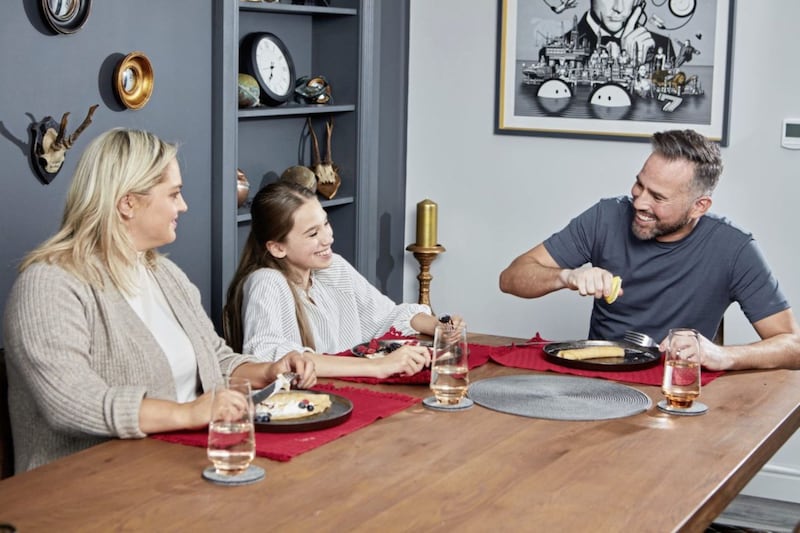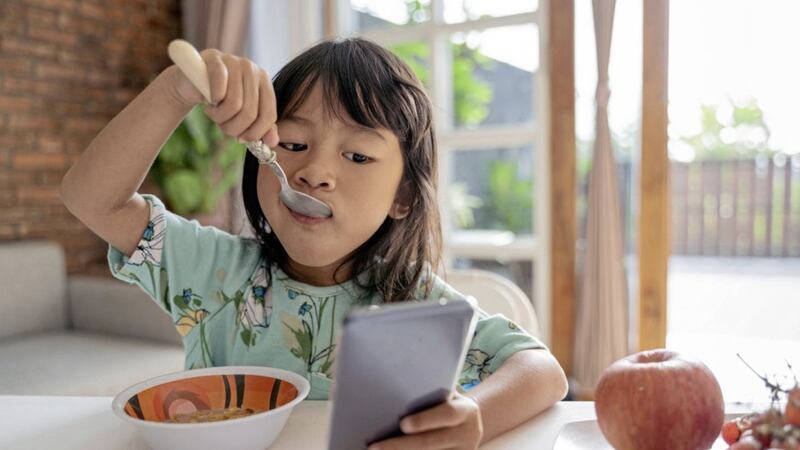FAMILIES sitting down for meals together can really help get everyone talking. Unless, that is, family members are interacting with their phones rather than the people they're sitting with.
New research has found only one in five families sit down for dinner together every day away from phones, devices and the TV. And the Vodafone study of 1,600 parents with a least one child at home discovered that trying to negotiate screen-free time causes tension, with 61 per cent of parents admitting getting children to switch off their devices is the biggest cause of disagreement in their household, leading to an average of two disputes a day.
But almost all parents (94 per cent) say having a break from technology is important for family relationships, and 86 per cent think dinner time is an important opportunity to spend quality time together.
Reflecting this, over half (55 per cent) say they've imposed rules on screen time, including no phones at the dinner table.
"Screen time is a real challenge for families, especially in a post-pandemic world where we've become more reliant on technology than ever before," says Carolyn Bunting, CEO of Internet Matters, which supports parents trying to navigate their children's digital life.
"Implementing screen-free mealtimes is a great way of ensuring children have clear boundaries and allows them to see the benefits of switching off as they engage with family face-to-face," she continues.

"A device-free dinnertime also provides parents with an opportunity to talk to their child about their online world and stay on top of what they get up to."
Mealtimes are indeed a great opportunity to find out what's going on in the rest of the family's life, says TV chef, cookbook author and MasterChef finalist Dean Edwards, who's been trying the new Vodafone Dinnertime Skill on Alexa (vodafone.co.uk/broadband), which activates 30 minutes of wifi-free digital downtime, with his daughter Indie (12) and fiancée Liz.
"Dinner time is increasingly important, not just to my family, but to families everywhere because we can struggle with the art of conversation and finding out what's gone on with the rest of the family's day," says Edwards.
"It's just an amazing opportunity for families to get together around the table, enjoy food and talk about what's going on in their lives, without reaching for tech every few minutes."
But what's the best way to achieve digital downtime at dinner? Here are tips from Edwards and parenting and tech experts.
1. Set a good example
The research found more than six in 10 parents have been caught out for breaking their own no-tech at the table rules, and Edwards confesses: "We focus on our children being on their devices, but I know as a parent I'm just as guilty.
"But to have that bit of downtime to catch up and reconnect and enjoy each other's company is really important. In terms of encouraging the others to put their devices down at the table, it starts with myself - I need to start to learn to put my tech down."
And parenting coach Lorraine Thomas, chief executive of The Parent Coaching Academy, adds: "My big tip would be for parents to make sure they model that behaviour themselves and do it as a family. Lots of young people complain to me that they're expected to switch phones off, but mum or dad can have it on because there may be an important work call."
2. Set boundaries with your kids
Get your children involved in the process of setting age-appropriate limits on how long they can spend online, at what times and on which platforms, suggests Bunting.
"Set up screen-free times or rooms where screens are out of sight and therefore more likely to be out of mind. Review these as they get older and give them the space to take greater responsibility for their screen use."

3. Make mealtimes fun
"The biggest tip I can suggest is to make mealtimes fun," advises Edwards.
"When I was growing up, dinnertime was really fun and we always had a great time around the table. But it starts before sitting down - get your children involved in the cooking, mixing, chopping and stirring, and teach them new skills in the kitchen.
"Kids are much more excited about sitting around the table when they've been involved in the process in the kitchen and have put the meal together."
4. Bribery may be needed...
The research found over half (53 per cent) of parents have bribed their children to put their device away, and Edwards admits he's been known to use a yummy chocolate treat to get his family off their phones.
"Sometimes we do need to resort to a couple of bribes, for Indie and for Liz as well," he says.
"We all like our sweet treats, so rustling up a hot chocolate topped with marshmallows and cream is the best way to trade-off putting the tech down in exchange for some uninterrupted time."
5. Avoid using screen-time as a reward
"This will elevate the status of screen-time above other activities and, like using food as a reward, may encourage children," warns Bunting.
6. Make it a challenge, not a law
How you frame the digital downtime can be crucial, and Thomas points out: "To teenagers particularly, calls from friends are really important. So present screen-free times like a challenge for the whole family, rather than laying down the law."
7. Make it a family strategy
Reflect on device strategy as a family, advises Thomas, who suggests: "Identify specific screen-free times and put them into action for seven days. Get the whole family's input, and show the importance of some compromise and negotiation."








